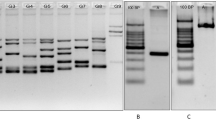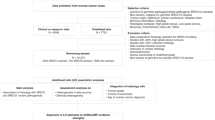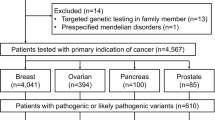Abstract
National guidelines recommend testing all cases of non-mucinous epithelial ovarian cancer (NMEOC) for germline (blood) and somatic (tumour) BRCA1/2 pathogenic variants (PVs). We performed paired germline and somatic BRCA1/2 testing in consecutive cases of NMEOC (n = 388) to validate guidelines. Thirty-four somatic BRCA1/2 (sBRCA) PVs (9.7%) were detected in 350 cases with germline BRCA1/2 (gBRCA) wild-type. All sBRCA PVs were detected in non-familial cases. By analysing our regional germline BRCA1/2 database there were 92/1114 (8.3%) gBRCA PVs detected in non-familial cases (only 3% ≥70 years old) and 245/641 (38.2%) in familial cases. Germline non-familial cases were dominated by BRCA2 in older women (8/271 ≥ 70 years old, all BRCA2). The ratio of sBRCA-to-gBRCA was ≤1.0 in women aged <70 years old, compared to 5.2 in women aged ≥70 years old (P = 0.005). The likelihood of missed germline BRCA1/2 PVs (copy-number variants missed on most somatic assays) by testing only tumour DNA was 0.4% in women aged ≥70 years old. We recommend reflex tumour BRCA1/2 testing in all NMEOC cases, and that gBRCA testing is not required for women aged ≥70 years old with no identifiable tumour BRCA1/2 PV and/or family history of breast, ovarian, prostate and/or pancreatic cancer.
This is a preview of subscription content, access via your institution
Access options
Subscribe to this journal
Receive 24 print issues and online access
$259.00 per year
only $10.79 per issue
Buy this article
- Purchase on Springer Link
- Instant access to full article PDF
Prices may be subject to local taxes which are calculated during checkout

Similar content being viewed by others
References
Ferlay J, Colombet M, Soerjomataram I, Dyba T, Randi G, Bettio M, et al. Cancer incidence and mortality patterns in Europe: Estimates for 40 countries and 25 major cancers in 2018. Eur J Cancer. 2018;103:356–87.
Coleman RL, Fleming GF, Brady MF, Swisher EM, Steffensen KD, Friedlander M, et al. Veliparib with first-line chemotherapy and as maintenance therapy in ovarian cancer. N. Engl J Med. 2019;385:2403–15.
Coleman RL, Oza AM, Lorusso D, Aghajanian C, Oaknin A, Dean A, et al. Rucaparib maintenance treatment for recurrent ovarian carcinoma after response to platinum therapy (ARIEL3): a randomised, double-blind, placebo-controlled, phase 3 trial. Lancet. 2017;390:1949–61.
Gonzalez-Martin A, Pothuri B, Vergote I, DePont Christensen R, Graybill W, Mirza MR, et al. Niraparib in patients with newly diagnosed advanced ovarian cancer. N Engl J Med. 2019;381:2391–402.
Moore K, Colombo N, Scambia G, Kim BG, Oaknin A, Friedlander M, et al. Maintenance olaparib in patients with newly diagnosed advanced ovarian cancer. N. Engl J Med. 2018;379:2495–505.
Hauke J, Hahnen E, Schneider S, Reuss A, Richters L, Kommoss S, et al. Deleterious somatic variants in 473 consecutive individuals with ovarian cancer: results of the observational AGO-TR1 study (NCT02222883). J Med Genet. 2019;56:574–80.
Huang KL, Mashl RJ, Wu Y, Ritter DI, Wang J, Oh C, et al. Pathogenic germline variants in 10,389 adult cancers. Cell. 2018;173:355–70.
Hennessy BT, Timms KM, Carey MS, Gutin A, Meyer LA, Flake DD 2nd, et al. Somatic mutations in BRCA1 and BRCA2 could expand the number of patients that benefit from poly (ADP ribose) polymerase inhibitors in ovarian cancer. J Clin Oncol. 2010;28:3570–6.
Pujol P, Barberis M, Beer P, Friedman E, Piulats JM, Capoluongo ED, et al. Clinical practice guidelines for BRCA1 and BRCA2 genetic testing. Eur J Cancer. 2021;146:30–47.
Konstantinopoulos PA, Norquist B, Lacchetti C, Armstrong D, Grisham RN, Goodfellow PJ, et al. Germline and somatic tumor testing in epithelial ovarian cancer: ASCO guideline. J Clin Oncol. 2020;38:1222–45.
Sundar S, Manchanda R, Gourley C, George A, Wallace A, Balega J, et al. British Gynaecological Cancer Society/British Association of Gynaecological Pathology consensus for germline and tumor testing for BRCA1/2 variants in ovarian cancer in the United Kingdom. Int J Gynecol Cancer. 2021;31:272–8.
Ellison G, Huang S, Carr H, Wallace A, Ahdesmaki M, Bhaskar S, et al. A reliable method for the detection of BRCA1 and BRCA2 mutations in fixed tumour tissue utilising multiplex PCR-based targeted next generation sequencing. BMC Clin Pathol. 2015;15:5.
Morgan RD, Bulman M, Clamp AR, MacMohon S, Thompson L, Ribeiro S, et al. Incidence of tumour BRCA1/2 variants in relapsed, platinum-sensitive ovarian, fallopian tube and primary peritoneal cancer. Ann Oncol. 2019;30:v403–v434.
Morgan RD, Burghel GJ, Flaum N, Bulman M, Clamp AR, Hasan J, et al. Prevalence of germline pathogenic BRCA1/2 variants in sequential epithelial ovarian cancer cases. J Med Genet. 2019;56:301–7.
Flaum N, Morgan RD, Burghel GJ, Bulman M, Clamp AR, Hasan J, et al. Mainstreaming germline BRCA1/2 testing in non-mucinous epithelial ovarian cancer in the North West of England. Eur J Hum Genet. 2020;28:1541–7.
Richards S, Aziz N, Bale S, Bick D, Das S, Gastier-Foster J, et al. Standards and guidelines for the interpretation of sequence variants: a joint consensus recommendation of the American College of Medical Genetics and Genomics and the Association for Molecular Pathology. Genet Med. 2015;17:405–24.
Alsop K, Fereday S, Meldrum C, deFazio A, Emmanuel C, George J, et al. BRCA mutation frequency and patterns of treatment response in BRCA mutation-positive women with ovarian cancer: a report from the Australian Ovarian Cancer Study Group. J Clin Oncol. 2012;30:2654–63.
Cunningham JM, Cicek MS, Larson NB, Davila J, Wang C, Larson MC, et al. Clinical characteristics of ovarian cancer classified by BRCA1, BRCA2, and RAD51C status. Sci Rep. 2014;4:4026.
Frugtniet B, Morgan S, Murray A, Palmer-Smith S, White R, Jones R, et al. The detection of germline and somatic BRCA1/2 genetic variants through parallel testing of patients with high-grade serous ovarian cancer: a national retrospective audit. BJOG. 2022;129:433–42.
Plaskocinska I, Shipman H, Drummond J, Thompson E, Buchanan V, Newcombe B, et al. New paradigms for BRCA1/BRCA2 testing in women with ovarian cancer: results of the Genetic Testing in Epithelial Ovarian Cancer (GTEOC) study. J Med Genet. 2016;53:655–61.
Flaum N, Crosbie EJ, Woodward ER, Lalloo F, Gareth Evans D. Challenging the believed proportion of ovarian cancer attributable to BRCA2 versus BRCA1 pathogenic variants. Eur J Cancer. 2020;124:88–90.
Hodgson DR, Brown JS, Dearden SP, Lai Z, Elks CE, Milenkova T, et al. Concordance of BRCA mutation detection in tumor versus blood, and frequency of bi-allelic loss of BRCA in tumors from patients in the phase III SOLO2 trial. Gynecol Oncol. 2021;163:563–8.
Callens C, Vaur D, Soubeyran I, Rouleau E, Just PA, Guillerm E, et al. Concordance between tumor and germline BRCA status in high-grade ovarian carcinoma patients in the phase III PAOLA-1/ENGOT-ov25 trial. J Natl Cancer Inst. 2021;113:917–23.
Fumagalli C, Tomao F, Betella I, Rappa A, Calvello M, Bonanni B, et al. Tumor BRCA test for patients with epithelial ovarian cancer: the role of molecular pathology in the era of PARP inhibitor therapy. Cancers. 2019;11:1641.
Acknowledgements
ERW and DGRE are supported by the Manchester National Institute for Health Research (NIHR) Manchester Biomedical Research Centre (IS-BRC-1215-20007). EJC is supported by a NIHR Advanced Fellowship (NIHR300650). NF is supported by CRUK via the funding to Cancer Research UK Manchester Centre: [C147/A18083] and [C147/A25254].
Funding
The tumour BRCA1/2 testing service was funded by AstraZeneca and Merck Sharp & Dohme, who gave permission to publish the data. Neither company had any influence in the writing of the manuscript or the views expressed by the authors.
Author information
Authors and Affiliations
Contributions
RDM and DGRE designed and initiated the study. RDM, NF, ARC, JH, CLM, ZS, ERW, FL, EJC, RJE, GCJ and DGRE gained consent for germline and tumour BRCA1/2 testing. GJB, MB, PS and AJW reported all germline and tumour BRCA1/2 results. All authors interpreted the data and reviewed the final version of the manuscript.
Corresponding author
Ethics declarations
Competing interests
RDM, GJB, NF, MB, PS, JH, CLM, ZS, ERW, FL, EJC, RJE, AJW and DGRE declare no competing interests. GCJ declares research funding from AstraZeneca for investigator-led clinical trials. ARC declares research funding and advisory boards fees from AstraZeneca, and speaker and advisory board fees from Clovis Oncology.
Ethics approval and consent to participate
All women included in this study provided informed consent to undergo germline and tumour BRCA1/2 testing. The germline BRCA1/2 database is approved by North Manchester Research Ethics Committee (08/H1006/77). The Genetic Variants in Gynaecological Cancer database is approved by the Christie NHS Foundation Trust (59).
Consent to publish
Not applicable.
Additional information
Publisher’s note Springer Nature remains neutral with regard to jurisdictional claims in published maps and institutional affiliations.
Rights and permissions
About this article
Cite this article
Morgan, R.D., Burghel, G.J., Flaum, N. et al. BRCA1/2 in non-mucinous epithelial ovarian cancer: tumour with or without germline testing?. Br J Cancer 127, 163–167 (2022). https://doi.org/10.1038/s41416-022-01773-y
Received:
Revised:
Accepted:
Published:
Issue Date:
DOI: https://doi.org/10.1038/s41416-022-01773-y



